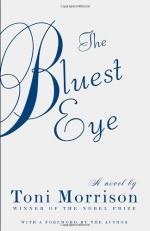|
This section contains 4,591 words (approx. 16 pages at 300 words per page) |

|
SOURCE: Rosenberg, Ruth. “Seeds in Hard Ground: Black Girlhood in The Bluest Eye.” MELUS 21, no. 4 (winter 1987): 435-45.
In the following essay, Rosenberg discusses several aspects of The Bluest Eye that differentiate Morrison's novel from earlier fictional accounts of African American girlhood, including descriptions of first menses and mother-daughter interactions, “colorism,” and the emotional precocity of pre-adolescent girls.
Little black girls learned their lessons in self-authentication from autobiographies of such artists as Mahalia Jackson, Maya Angelou, and Bessie Smith, which explained how, in spite of immense obstacles, one might fashion a self.1 When Sherley Anne Williams was a troubled twelve-year-old in the fifties, she searched, in vain, through the shelves of her junior high school library for some fictionalized depiction of her own problems. Because she found nothing there that would speak to her difficulties, she says, she “was led, almost inevitably … to the autobiographies of women entertainers—Eartha...
|
This section contains 4,591 words (approx. 16 pages at 300 words per page) |

|


